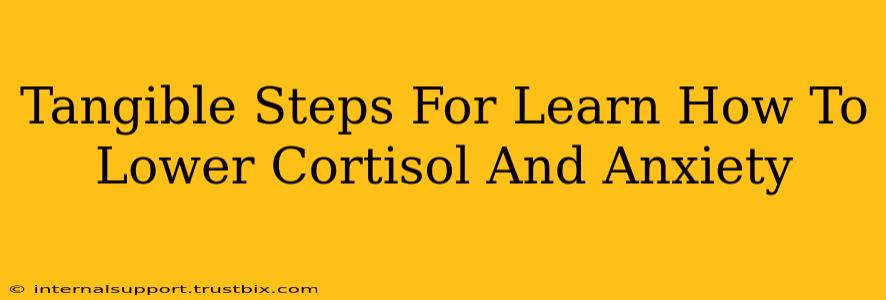Feeling overwhelmed by stress and anxiety? High cortisol levels, often linked to chronic stress, can wreak havoc on your physical and mental well-being. But don't worry, you're not powerless. This guide provides tangible steps you can take to lower your cortisol and alleviate anxiety. We'll focus on practical strategies you can implement today to start feeling calmer and more in control.
Understanding the Cortisol-Anxiety Connection
Before diving into solutions, let's briefly understand the relationship between cortisol and anxiety. Cortisol, your body's primary stress hormone, is crucial for the "fight-or-flight" response. However, prolonged elevation of cortisol due to chronic stress can lead to:
- Increased anxiety and irritability: Constantly high cortisol levels disrupt your nervous system, making you feel on edge and easily agitated.
- Sleep disturbances: Cortisol interferes with sleep quality, leading to insomnia and further exacerbating anxiety.
- Weakened immune system: Chronic stress weakens your body's defenses, making you more susceptible to illness.
- Weight gain: High cortisol can lead to increased abdominal fat storage.
Practical Steps to Lower Cortisol and Manage Anxiety
Now for the good part – the actionable strategies to help you regain control:
1. Prioritize Sleep Hygiene: The Foundation of Wellbeing
Sleep is your superpower when it comes to managing stress. Aim for 7-9 hours of quality sleep nightly. Here's how:
- Establish a consistent sleep schedule: Go to bed and wake up around the same time each day, even on weekends.
- Create a relaxing bedtime routine: This could include a warm bath, reading a book, or listening to calming music.
- Optimize your sleep environment: Make sure your bedroom is dark, quiet, and cool.
- Limit screen time before bed: The blue light emitted from electronic devices interferes with melatonin production, making it harder to fall asleep.
2. Embrace Mindful Movement: Beyond the Gym
Exercise is fantastic for lowering cortisol, but it doesn't have to mean grueling workouts. Find activities you enjoy:
- Yoga and Tai Chi: These practices combine physical movement with mindfulness, promoting relaxation and reducing stress.
- Walking in nature: Spending time outdoors has been shown to reduce stress hormones and improve mood.
- Dancing: Let loose and have fun! Physical activity releases endorphins, which have mood-boosting effects.
3. Nourish Your Body with Stress-Reducing Foods
Your diet plays a vital role in managing stress and anxiety. Focus on:
- Whole foods: Fruits, vegetables, whole grains, and lean protein provide sustained energy and essential nutrients.
- Omega-3 fatty acids: Found in fatty fish, flaxseeds, and walnuts, these healthy fats support brain health and reduce inflammation.
- Magnesium-rich foods: Dark leafy greens, nuts, and seeds are excellent sources of magnesium, a mineral that helps regulate stress hormones.
- Limit processed foods, sugar, and caffeine: These can exacerbate anxiety and disrupt sleep.
4. Harness the Power of Mindfulness and Meditation
Mindfulness techniques help you become more aware of your thoughts and feelings without judgment.
- Meditation: Even just 5-10 minutes a day can significantly reduce stress and anxiety. There are countless guided meditations available online.
- Deep breathing exercises: Practicing deep, slow breaths can quickly calm your nervous system.
- Mindful moments: Throughout the day, take a few moments to focus on your breath and your surroundings.
5. Connect with Others: The Social Buffer
Strong social connections are crucial for emotional well-being.
- Spend time with loved ones: Talking to friends and family can provide emotional support and reduce stress.
- Join a support group: Connecting with others who understand what you're going through can be incredibly helpful.
- Engage in activities you enjoy with others: Shared experiences create positive memories and strengthen bonds.
6. Seek Professional Guidance When Needed
If your anxiety and stress are persistent or overwhelming, don't hesitate to seek professional help. A therapist can provide support and guidance, and may recommend additional strategies such as therapy or medication.
Conclusion: Your Journey to Lower Cortisol Starts Now
Lowering cortisol and managing anxiety is a journey, not a destination. By consistently implementing these strategies, you'll equip yourself with the tools you need to navigate stress more effectively and create a calmer, more fulfilling life. Remember, small, consistent changes can make a big difference. Start today, and begin feeling the positive impact on your overall well-being.

